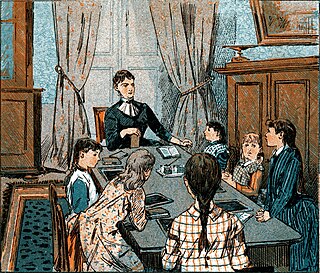
Homeschooling or home schooling, also known as home education or elective home education (EHE), is the education of school-aged children at home or a variety of places other than a school. Usually conducted by a parent, tutor, or an online teacher, many homeschool families use less formal, more personalized and individualized methods of learning that are not always found in schools. The actual practice of homeschooling can vary. The spectrum ranges from highly structured forms based on traditional school lessons to more open, free forms such as unschooling, which is a lesson- and curriculum-free implementation of homeschooling. Some families who initially attended a school go through a deschool phase to break away from school habits and prepare for homeschooling. While "homeschooling" is the term commonly used in North America, "home education" is primarily used in Europe and many Commonwealth countries. Homeschooling should not be confused with distance education, which generally refers to the arrangement where the student is educated by and conforms to the requirements of an online school, rather than being educated independently and unrestrictedly by their parents or by themselves.
The philosophy of education is the branch of applied philosophy that investigates the nature of education as well as its aims and problems. It includes the examination of educational theories, the presuppositions present in them, and the arguments for and against them. It is an interdisciplinary field that draws inspiration from various disciplines both within and outside philosophy, like ethics, political philosophy, psychology, and sociology. These connections are also reflected in the significant and wide-ranging influence the philosophy of education has had on other disciplines. Many of its theories focus specifically on education in schools but it also encompasses other forms of education. Its theories are often divided into descriptive and normative theories. Descriptive theories provide a value-neutral account of what education is and how to understand its fundamental concepts, in contrast to normative theories, which investigate how education should be practiced or what is the right form of education.
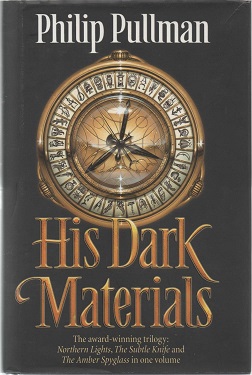
His Dark Materials is a trilogy of fantasy novels by Philip Pullman consisting of Northern Lights, The Subtle Knife (1997), and The Amber Spyglass (2000). It follows the coming of age of two children, Lyra Belacqua and Will Parry, as they wander through a series of parallel universes. The novels have won a number of awards, including the Carnegie Medal in 1995 for Northern Lights and the 2001 Whitbread Book of the Year for The Amber Spyglass. In 2003, the trilogy was ranked third on the BBC's The Big Read poll.

James Clayton Dobson Jr. (born April 21, 1936) is an American evangelical Christian author, psychologist, and founder of Focus on the Family (FOTF), which he led from 1977 until 2010. In the 1980s he was ranked as one of the most influential spokesmen for conservative social positions in American public life. Although never an ordained minister, he was called "the nation's most influential evangelical leader" by The New York Times while Slate portrayed him as a successor to evangelical leaders Jerry Falwell and Pat Robertson.
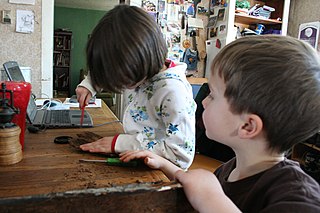
Unschooling is an informal learning that advocates learner-chosen activities as a primary means for learning. Unschoolers learn through their natural life experiences including play, household responsibilities, personal interests and curiosity, internships and work experience, travel, books, elective classes, family, mentors, and social interaction. Often considered a lesson- and curriculum-free implementation of homeschooling, unschooling encourages exploration of activities initiated by the children themselves, believing that the more personal learning is, the more meaningful, well-understood and therefore useful it is to the child. While courses may occasionally be taken, unschooling questions the usefulness of standard curricula, fixed times at which learning should take place, conventional grading methods in standardized tests, forced contact with children in their own age group, the compulsion to do homework, regardless of whether it helps the learner in their individual situation, the effectiveness of listening to and obeying the orders of one authority figure for several hours each day, and other features of traditional schooling in the education of each unique child.
Civics is the study of the rights and obligations of citizens in society. The term derives from the Latin word civicus, meaning "relating to a citizen". The term relates to behavior affecting other citizens, particularly in the context of urban development.
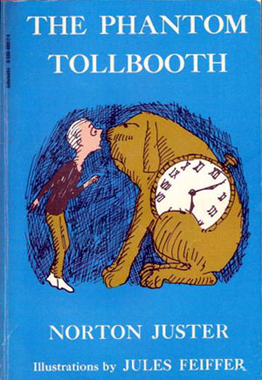
The Phantom Tollbooth is a children's fantasy adventure novel written by Norton Juster, with illustrations by Jules Feiffer, first published in 1961. The story follows a bored young boy named Milo who unexpectedly receives a magic tollbooth that transports him to the once prosperous, but now troubled, Kingdom of Wisdom. Along with a dog named Tock and the Humbug, Milo goes on a quest to the Castle in the Air seeking the kingdom's two exiled princesses, named Rhyme and Reason. As Milo learns valuable lessons, he finds a love of learning in a story full of puns and wordplay, such as exploring the literal meanings of idioms.

John Caldwell Holt was an American author and educator, a proponent of homeschooling, and a pioneer in youth rights theory.
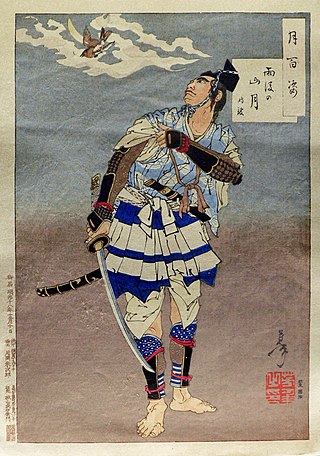
Discipline refers to rule following behavior, to regulation, order, control and authority. It may also refer to punishment. Discipline is used to create habits, routines, and automatic mechanisms such as blind obedience. It may be inflicted on others or on oneself. Self discipline refers to the practice of self restraint, controlling one's emotions, and ignoring impulses.

Robert Toru Kiyosaki is an American entrepreneur, businessman and author. Kiyosaki is the founder of Rich Global LLC and the Rich Dad Company, a private financial education company that provides personal finance and business education to people through books and videos. The company's main revenues come from franchisees of the Rich Dad seminars that are conducted by independent individuals using Kiyosaki's brand name. He is also the creator of the Cashflow board and software games to educate adults and children about business and financial concepts.

The Witches is a children's dark fantasy novel by British author Roald Dahl. The story is set partly in Norway and partly in England, and features the experiences of a young English boy and his Norwegian grandmother in a world where child-hating societies of witches secretly exist in every country. The witches are ruled by the vicious and powerful Grand High Witch, who arrives in England to organize her plan to turn all of the children there into mice.

Takalani Sesame is the South African co-production of the children's television program Sesame Street, co-produced by Sesame Workshop and South African partners. The series debuted in 2000 and currently airs on SABC 2.
Deschooling is a term invented by Austrian philosopher Ivan Illich. Today, the word is mainly used by homeschoolers, especially unschoolers, to refer to the transition process that children and parents go through when they leave the school system in order to start homeschooling. It is a crucial process that is the basis for homeschooling to work, in which children should slowly break out of their school routine and mentality, develop the ability to learn via self-determination again, and find interests to decide what they want to learn in their first homeschool days. Depending on the type of person and time the child spent in the school system, this phase can last different lengths of time and may have different effects on the behavior of children. Especially in the first days of deschooling, it is often the case that children mainly want to recover from the school surroundings and therefore will generally sleep very long and refuse any kind of intentional learning and instead search for substitute satisfactions like watching TV or playing video games, very similar to the behavior during early school holidays. Moving on in this transition process, children may feel bored or cannot cope well with the missing daily structure, until they eventually find out how to make use of their time and freedom to find interests, which in the best case results in them voluntarily informing themselves about certain things they are interested in, whereupon homeschooling can start.

Where the Wild Things Are is a 1963 children's picture book written and illustrated by American writer and illustrator Maurice Sendak, originally published in hardcover by Harper & Row. The book has been adapted into other media several times, including an animated short film in 1973 ; a 1980 opera; and a live-action 2009 feature-film adaptation. The book had sold over 19 million copies worldwide as of 2009, with 10 million of those being in the United States.
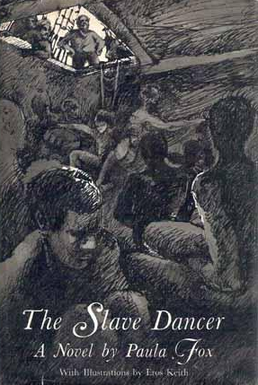
The Slave Dancer is a historical novel written by Paula Fox and published in 1973. It tells the story of a boy called Jessie Bollier who witnessed first-hand the savagery of the Atlantic slave trade. The book not only includes a historical account, but it also touches upon the emotional conflicts felt by those involved in transporting the slaves from Africa to other parts of the world. It tells the story of a thirteen-year-old boy, Jessie Bollier, who is put in a position which allows him to see the African slave trade in person. Jessie is captured from his New Orleans home and brought to an American ship. There he is forced to play the fife in order to keep the other slaves dancing, and thus strong when they arrive at their destination. The book received the Newbery Medal in 1974.
Inventive spelling is the use of unconventional spellings of words.
Anti-schooling activism or radical education reform describes positions that are critical of school as a learning institution and/or compulsory schooling laws or multiple attempts and approaches to fundamentally change the school system respectively. People of this movement usually advocate alternatives to the traditional school system, education independent from school, the absence of the concept of schooling as a whole, or at least the right that people can choose where and how they are educated.
Holistic education is a movement in education that seeks to engage all aspects of the learner, including mind, body, and spirit. Its philosophy, which is also identified as holistic learning theory, is based on the premise that each person finds identity, meaning, and purpose in life through connections to their local community, to the natural world, and to humanitarian values such as compassion and peace.

How Children Fail is a non-fiction book by John Holt that was published in 1964 and republished in 1982 in a revised edition. It has sold over a million copies. In it, he cites personal teaching and research experiences that led him to the belief that traditional schooling does more harm than good to a child's ability and desire to truly learn.

Hilda Taba was an architect, a curriculum theorist, a curriculum reformer, and a teacher educator. Taba was born in the small village of Kooraste, Estonia. Her mother's name was Liisa Leht, and her father was a schoolmaster whose name was Robert Taba. Hilda Taba began her education at the Kanepi Parish School. She then attended the Võru’s Girls’ Grammar School and earned her undergraduate degree in English and Philosophy at the University of Tartu. When Taba was given the opportunity to attend Bryn Mawr College in Pennsylvania, she earned her master's degree. Following the completion of her degree at Bryn Mawr College, she attended Teachers College at Columbia University. She applied for a job at the University of Tartu but was turned down because she was female, so she became curriculum director at the Dalton School in New York City. In 1951, Taba accepted an invitation to become a professor at San Francisco State College, now known as San Francisco State University.













